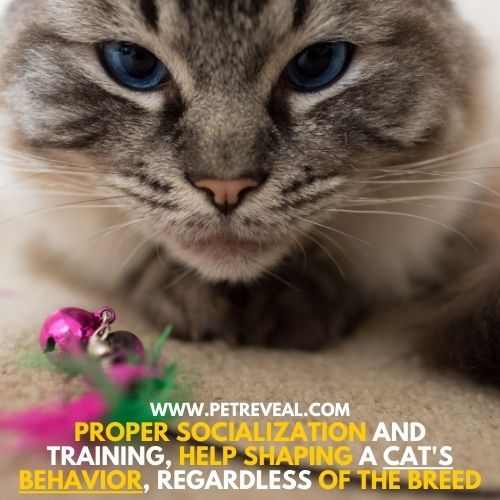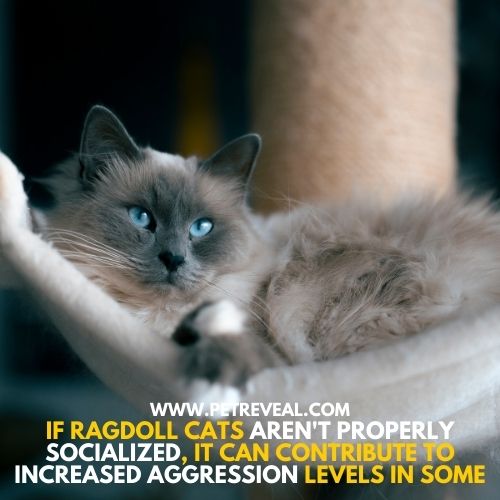Are Ragdoll Cats aggressive? Aggressions is an unlikely characteristic for Ragdoll cats. Delve into their renowned gentle nature and learn why aggression is rarely a concern with these beloved feline companions. Explore expert insights and tips for nurturing a harmonious relationship with your Ragdoll cat.
Jump to a Specific Section
Ragdoll Cat Breed Characteristics
Ragdoll cats have distinctive breed characteristics that set them apart from other cat breeds. One notable trait is their large size and muscular build. These cats are known for their strong and sturdy bodies, which can weigh up to 20 pounds in males.

Another distinguishing feature is their striking blue Personal Experiences With Ragdoll Cats
Based on personal experiences, many owners have found Ragdoll cats to be incredibly affectionate and gentle pets. These cats are known for their calm and docile nature, making them perfect companions for families and individuals alike. Ragdolls are often described as being Expert Opinions on Ragdoll Cat Aggression
If you’re curious about what experts have to say about the potential aggression in Ragdoll cats, you’ll find valuable insights from professionals in the field. According to experts, Ragdoll cats are generally not aggressive. They’re known for their gentle and calm nature, making them one of the most docile cat breeds. Dr. Leslie Lyons, a renowned feline geneticist, states that Ragdolls have a sweet and affectionate temperament, which isn’t prone to aggression. Similarly, Dr. Karen Becker, a veterinarian, confirms that Ragdolls are peaceful companions and are unlikely to display aggressive behavior. However, experts emphasize that individual cat personalities may vary, and there can be exceptions. It’s important to remember that proper socialization, training, and a loving environment play a significant role in shaping a cat’s behavior, regardless of the breed. One common misconception about the behavior of Ragdoll cats is that they’re prone to aggression. However, this belief isn’t entirely accurate. While it’s true that all cats, regardless of breed, have the potential to display aggressive behavior, Ragdolls are generally known for their docile and gentle nature. They’re often described as being calm, friendly, and affectionate towards their owners. Ragdolls are known to be very social cats and enjoy spending time with their human companions. They aren’t typically aggressive towards other animals or strangers. It’s important to note that individual cat behavior can vary, and there may be some Ragdolls that exhibit aggressive tendencies. However, this isn’t a common characteristic of the breed as a whole. Like a ticking time bomb, aggression in ragdoll cats can be a perplexing and concerning issue for owners. While these feline companions are known for their gentle and docile nature, there are certain factors that can ignite their fiery temperament. From genetic predispositions to environmental stressors, understanding the reasons behind their aggressive behavior is crucial in maintaining a harmonious relationship. So, what exactly triggers this unexpected switch in their demeanor? Let’s unravel the complexities and uncover the hidden culprits that can turn your sweet ragdoll into a fierce adversary. Genetics and breed characteristics play a significant role in determining the aggression levels of Ragdoll cats. These factors influence their temperament and behavior. Ragdolls are known for their gentle and docile nature, making them popular as family pets. However, certain genetic traits can contribute to increased aggression in some individuals. For example, if a Ragdoll cat comes from a lineage with a history of aggressive behavior, there’s a higher chance that it may display aggressive tendencies. Additionally, specific breed characteristics, such as a dominant personality or territorial instincts, can also influence the aggression levels of Ragdolls. It’s important for potential owners to research the genetic background and breed characteristics of Ragdoll cats to better understand and address any potential aggression issues. If Ragdoll cats aren’t properly socialized, it can contribute to increased aggression levels in some individuals. Socialization is crucial for any cat breed, including Ragdolls. These cats need to be exposed to various people, animals, and environments from a young age to develop positive social skills. Without proper socialization, Ragdolls may become fearful, anxious, or defensive, leading to aggressive behavior. They may display aggression towards unfamiliar people or animals, or even towards their owners. Lack of socialization can also lead to other behavioral issues, such as excessive scratching or biting. To prevent aggression caused by lack of socialization, it’s important to expose Ragdoll cats to different experiences, people, and animals early on, allowing them to become well-adjusted and sociable pets. A stressful environment can greatly contribute to increased aggression levels in Ragdoll cats. Cats are sensitive creatures, and when placed in an environment that constantly puts them on edge, their stress levels skyrocket. Loud noises, frequent disruptions, and overcrowded spaces can all contribute to a stressful environment for your Ragdoll cat. When they feel overwhelmed and unable to escape from these stressors, they may become more aggressive as a way to protect themselves. Additionally, changes in their routine or surroundings, such as moving to a new home or the introduction of new pets, can also trigger stress and aggression. It’s important to create a calm and peaceful environment for your Ragdoll cat, providing them with plenty of hiding spots, quiet spaces, and a consistent routine to help alleviate their stress and reduce their aggression levels.


Common Misconceptions About Ragdoll Cat Behavior

What Factors Can Make Ragdoll Cats Aggressive?

Genetics and Breed Characteristics

Lack of Socialization

Stressful Environment
Medical Conditions and Pain
